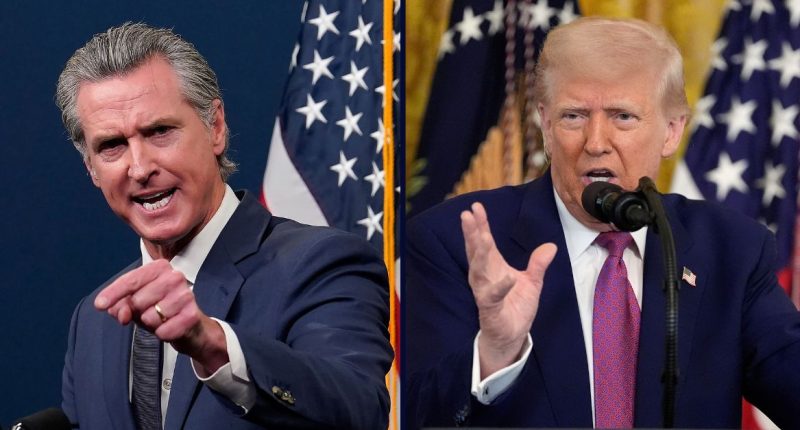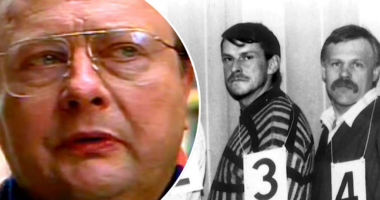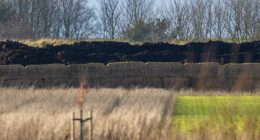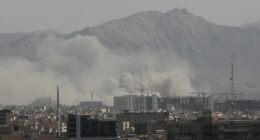Share this @internewscast.com
On the left, Calif. Gov. Gavin Newsom is shown presenting his revised state budget during a news conference in Sacramento, Calif., on Wednesday, May 14, 2025 (Photo/Rich Pedroncelli, File). On the right, President Donald Trump is captured speaking at an event to sign a bill that blocks California’s rule banning the sale of new gas-powered cars by 2035, held in the East Room of the White House, Thursday, June 12, 2025, in Washington (AP Photo/Alex Brandon).
A federal judge in California has decided not to postpone this week’s hearing concerning the Trump administration’s deployment of the California National Guard to areas of Los Angeles amid protests over immigration enforcement. This decision comes just days after an appellate court stayed his order that had temporarily blocked the troop mobilization.
In a succinct two-page order, U.S. District Judge Charles R. Breyer on Saturday dismissed a request from the U.S. Department of Justice to adjust the briefing schedule in the case by postponing a hearing set for Friday. The DOJ had requested Breyer to delay the proceedings until the U.S. Court of Appeals for the 9th Circuit made a decision on the administration’s emergency motion for a stay pending appeal.
According to Breyer, pushing back the scheduled hearings would not benefit the parties to the case or the higher court.
“Delay would be counterproductive. Preliminary injunction briefing would supplement the evidentiary record in this case, providing additional detail and contemporary facts about an evolving situation,” the judge wrote. “Indeed, Plaintiffs represent that there are already changed facts relating to: ‘how National Guard troops are being deployed; how Marines are being utilized …; what the current situation is with regard to unrest on the ground; and whether state law enforcement and federal authorities can adequately address such actions.’”
Love true crime? Sign up for our newsletter, The Law&Crime Docket, to get the latest real-life crime stories delivered right to your inbox.
Indeed, Breyer wrote that a “more fulsome record” would only help him to assess the “proprietary and scope of any preliminary injunctive relief” while also helping the appeals court “if and when” it decides to take up the case.
The judge also highlighted California’s assertion that there are “serious doubts as to whether the 9th Circuit has jurisdiction” to hear the Trump administration’s appeal of the temporary restraining order (TRO) he issued Thursday evening. However, Breyer did not take a position regarding the appellate court’s jurisdiction or lack thereof.
In last week’s TRO ruling, Breyer held that Trump’s move to assume control over the National Guard in the Golden State was both “illegal” and in violation of the 10th Amendment of the Constitution. He further directed the administration to return control of the National Guard to California Gov. Gavin Newsom, who filed the federal lawsuit.
The Justice Department immediately appealed, calling Breyer’s action “an extraordinary intrusion on the President’s constitutional authority as Commander in Chief” and asserting that the judge lacked the authority for reviewing or “second-guessing” the president’s order. The administration insisted that Trump had “more than ample grounds to determine that the riots rose to the level of a ‘danger’ of rebellion, and that state and local law enforcement were ‘unable’ to sufficiently protect federal personnel and property.”
Less than three hours later, a three-judge panel on the 9th U.S. Circuit Court of Appeals issued an administrative stay on Breyer’s order. Though the panel did not provide its reasoning, an administrative stay is typically used to buy an appellate court time to deliberate issues that cannot be quickly evaluated and does not ordinarily reflect the court’s consideration of the case on the merits.
The appellate panel includes U.S. Circuit Judges Mark Bennett and Eric Miller, both Trump appointees, and Jennifer Sung, a Joe Biden appointee. A hearing in that case is scheduled for Tuesday at noon.
















